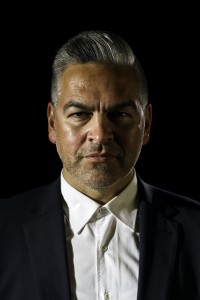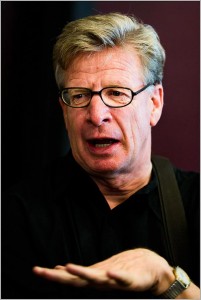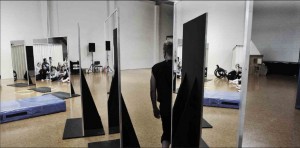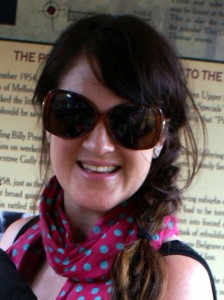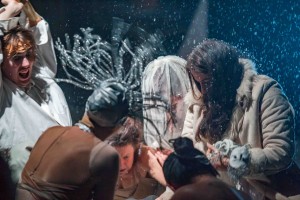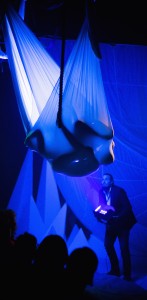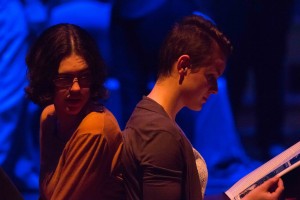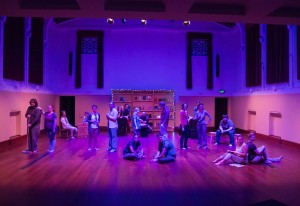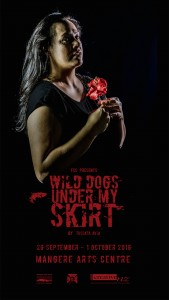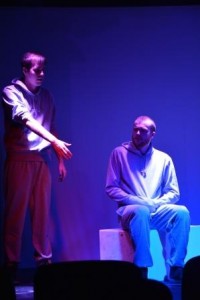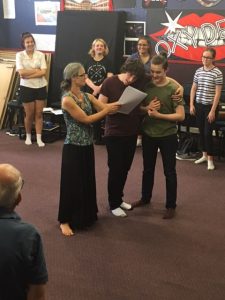 Don’t miss this year’s amazing Summer Shakespeare production of “The Winter’s Tale” directed by Sara Brody, which begins on March 2nd, 3rd, 4th, 9th, 10th and 11th at 7.30 pm at Victoria Esplanade, Palmerston North. As part of our Shakespeare in Schools Project run by our School in Manawatu, Sara worked with drama students at Freyberg High School on Tuesday during a workshop on “The Winter’s Tale”.
Don’t miss this year’s amazing Summer Shakespeare production of “The Winter’s Tale” directed by Sara Brody, which begins on March 2nd, 3rd, 4th, 9th, 10th and 11th at 7.30 pm at Victoria Esplanade, Palmerston North. As part of our Shakespeare in Schools Project run by our School in Manawatu, Sara worked with drama students at Freyberg High School on Tuesday during a workshop on “The Winter’s Tale”.
Category Archives: Theatre
“Lifetime” achievement
Manawatu River becomes a Shakespearean backdrop
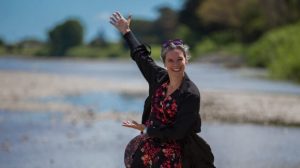 Director Sara Brodie is bringing a bit of wild to Summer Shakespeare 2017, with the Manawatu River as a backdrop and all sorts of surprises planned.
Director Sara Brodie is bringing a bit of wild to Summer Shakespeare 2017, with the Manawatu River as a backdrop and all sorts of surprises planned.
In her position as the artist in residence at Massey University, the Kapiti-based director and choreographer has chosen The Winter’s Tale as her play.
“It’s comic and tragic and I want to evoke a winter’s night and the fantastic tale element of it as much as possible.”
A stretch of Palmerston North’s Esplanade river walkway will be the stage for the open theatre piece, and Brodie said all sorts of things become possible in such a setting.
“When the audience actually come along here it will all be set up like a mid-winter fair with braziers, bunting, food stories and fire poi. We enter into the court scenes first where the jealous ravings of King Leontes start.”
Brodie is no stranger to staging outdoor events and said the “happy accidents” that occur are one of the best elements.
“Beautiful sunsets or wind at just the right moment. Those sort of things that really add to the experience for people. This will be like going into the fantastical wilds.”
The annual event is in it’s 14th year and will be drawing on Palmerston North’s non-professional theatre community for the production that will be held next March.
A workshop will be held at 10am on Saturday at Massey University’s Sir Geoffrey Peren Building, which Brodie said will give people an idea of the process.
“It’s for anyone who is interested to come along to meet me and to hear about the production and see some concept imagery around it. We will talk about the story and get our teeth into some of the text and some exercises to have some fun with it.”
Formal auditions for The Winter’s Tale will be held at the end of November and as well as actors and dancers, Brodie is also on the look out for production behind-the-scenes people.
Globe Theatre Awards – Massey’s nominations
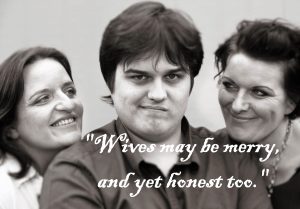 We are delighted with the nominations for the Globe Theatre Awards across four Massey University productions this year. Our student driven production, Arts Uncontrolled, received a nomination for best ensemble. MUDS (our drama society) received two nominations for Misfits, and Kelly Harris received a nomination for Best direction for our Summer Shakespeare production The Merry Wives of Windsor. Our third year course Modern Drama received three nominations for their production of Love and Information, directed by Rachel Lenart.
We are delighted with the nominations for the Globe Theatre Awards across four Massey University productions this year. Our student driven production, Arts Uncontrolled, received a nomination for best ensemble. MUDS (our drama society) received two nominations for Misfits, and Kelly Harris received a nomination for Best direction for our Summer Shakespeare production The Merry Wives of Windsor. Our third year course Modern Drama received three nominations for their production of Love and Information, directed by Rachel Lenart.
The winners will be announced during an awards ceremony at the Globe Theatre in Palmerston North on 24 February 2017.
Theatre with Massey has had an outstanding year in Palmerston North! Congratulations to all our nominees.
NUTS Newsletter #12
Editorial
Welcome to the twelfth edition of NUTS NZ – the Newsletter for University Theatre Studies New Zealand. The purpose of the newsletter is to help us communicate more effectively as a community of scholars interested in Theatre and Performance. We have an interesting selection of stories and items for you in our final issue for 2016. First up, we would like to remind you that this year’s National Examiners and NZ Universities Committee for Theatre/Performance Research meetings will be hosted by Otago University on Tuesday 15th November. There are also some important events coming up that you should note in your calendar. This includes the Auckland University’s symposium Accessible Arts: Practice and Barriers which is happening today – but is an important event we thought we should bring to your attention. Don’t forget that the University of Otago is hosting the interdisciplinary conference entitled ‘Performing precarity: Refugee representation, determination, and discourses’ from 21-23 November 2016. Should be an interesting event. Also, we’ve included some information on the ADSA conference next year which is entitled ‘Performing Belonging in the 21st Century’. The deadline for the ADSA conference is looming – abstracts are due in on Monday the 20th of November! There is also the Social Alternatives’ call for papers on ‘Issues on Performing, Community, and Intervention’. We also have information on Victoria University’s latest play – The Trojan Women – and a link to the review. In our last “NUTS People” segment for the year, we are profiling Victor Rodger and Stuart Hoar. We are not sure if we will be back again next year, but if we are, we will be looking for your support and contributions to make this newsletter work.
Kind regards,
NUTS NZ editors: Jane Marshall and Rand Hazou.
NUTS People
In each edition of NUTS NZ we profile an academic and a postgraduate student to show case “our people” and their current research/interests. In this issue we have Hilary Halba and Kiri Bell from The University of Otago. As always, NUTS NZ asked each of them to answer the following questions:
- What is your research about?
- What theatre/performances have you seen recently?
- What have you been reading lately?
Victor Rodger
This year my theatre entity, FCC, produced two plays: Puzzy by Hawaiian-Filipina writer Kiki – with additional material by myself – and Wild Dogs Under My Skirt by my cousin, Tusiata Avia. As this year’s Robert Burns Fellow at the University of Otago, I’ve worked on a few projects: Black Ice (a family drama), White Noise (an academic comedy), and I also worked on a cabaret called Christ(church) Almighty which will – hopefully – get on its feet in Christchurch next year.
I have recently read Girl on The Train and – most recently – Gone Girl. This is because I’ve been dabbling with the thriller form myself. Currently, I’m reading Eileen by Ottessa Moshfegh which was shortlisted for the Booker this year. After that, I’m going to read The Mandibles by Lionel Shriver whose controversial speech at the Brisbane Writers Festival certainly made me roll my eyes.
The most recent performance I saw was a show devised by two NASDA honours students, Asovale Luma and Shea Kouka, in Christchurch called Mai Slam. They used six local kids from Aranui and the show was a mixture of spoken word, song and skits. It was a work in progress and was certainly a bit rough around the edges but I came out of that show feeling like I’d had more fun watching that than just about anything else I’d seen this year. I also recently caught Not in Our Neighbourhood by Jamie McCallister. He’s my pick of the current writers in NZ for his ability to be able to write relevant, hard-hitting drama as well as well-crafted low-brow comedy.
Stuart Hoar
I’m currently rewriting a play about a drone pilot who meets a NZ woman. They have an affair but he neglects to tell her precisely what his job is. This play was written a year or two ago and has had a reading by ATC. I’m also trying to finish a novel I’ve been writing for a long time, only a few thousand words to go. I’m also researching for a new play I hope to start work on soon; this is a play about Michael Joseph Savage and Ned Kelly.
Books I have lately read are The Writers’ Festival by Stephanie Johnson, The Spy Who Came in from the Cold by John Le Carré, Attila the Hun by John Mann and a new play This I Know to be True by Andrew Bovell.
Plays I’ve been to recently include Billy Elliot, Call of the Sparrow, Retro Williams, The Protest, The Pink Hammer, Lucrece, Zen Dog Sartori, Shot Bro and A Ghost Tale.
Symposiums
Accessible Arts: Practice and Barriers
Friday 11th November 2016, 1.30-3.30pm
M2 Drama Studio, Faculty of Education and Social Work, University of Auckland, 74 Epsom Avenue
A half-day symposium for practitioners, researchers, students and disabled people who share an interest in disability arts and accessible arts practices. Presentations and discussions will focus on how participants might better achieve inclusive outcomes in schools, community settings and higher education.
Discussants:
Emma Bennison (via Skype) – CEO Arts Access Australia
Stuart Shepherd – Curator and Lecturer at Bay of Plenty Polytech, and Tutor at Mapura Studio
Margaret Feeney – Studio Coordinator and Arts Tutor, Mapura Arts Studio
Laura Haughey – Senior Lecturer in Theatre Studies, University of Waikato
Sue Cheesman – Senior Lecturer in Dance Education, University of Waikato, and tutor for Touch Compass
Chairs:
Rod Wills and Molly Mullen, School of Critical Studies in Education/Critical Research Unit in Applied Theatre
This event is free and includes afternoon tea.
Places are limited so please register via https://www.eventbrite.com/e/accessible-arts-practice-and-barriers-tickets-28926871050
For more information contact: m.mullen@auckland.ac.nz
Conferences
Performing precarity: Refugee representation, determination, and discourses
21-23 November 2016
The University of Otago, Dunedin,
Keynotes:
Professor Suvendrini Perera (Curtin University, Perth, Australia) & Professor Nikos Papastergiadis (University of Melbourne, Australia)
The current European refugee crisis continues to be a major focus of media attention as well as a point of political, cultural, ethical and social conflict. Images of migrants are constructed, mediated and circulated to create compelling representations of refugee-hood that serve a variety of agendas and conform to specific identities and expectations. They are, in this sense, performances. In addition, refugees in Europe and other regions, including Australasia, are subjected to detention and/or expected to perform/conform in certain ways to meet the shifting demands of determination processes and the cultural preferences of different regions. Once released from detention and/or recognised as refugees, another set of performances ensues – ‘welcome’ from the host country and ‘gratitude’ from the refugee. This interdisciplinary conference aims to draw together scholars from a wide variety of fields to examine the ethics and politics surrounding refugee representation, determination, and discourses.
ADSA: Performing Belonging in the 21st Century
27 – 30 June 2017
Auckland University of Technology, Auckland University, Massey University
KEY DATES: Monday 20 November 2016 – Abstracts Due and Monday 11 December 2016 – Notification of Acceptance
The Māori concept of tūrangawaewae suggests a place to stand, a homeland, a way of belonging. Belonging, like identity, is a matter of ongoing performance: on stages and in the streets, in community halls, clubs, sporting arenas, churches and parliaments. In ‘Belonging and the politics of belonging’ (Patterns of Prejudice 2006), Nira Yuval-Davis observes that ‘Belonging is about emotional attachment, about feeling “at home”’ (197), and later notes:
The politics of belonging includes also struggles around the determination of what is involved in belonging, in being a member of a community, and of what roles specific social locations and specific narratives of identity play in this. (205)
Belonging may be deeply felt, but it is also manifestly constructed and capitalised upon, a matter of collectivity and communality, of inclusion and also of exclusion. We make ourselves into an ‘us’ by marking others as ‘them’, say we are of this place and they are not. Belonging is thus also a matter of desire, as much of longing to be as it is of being per se. Echoing Zygmunt Bauman and Leonidas Donskis, who want to ‘rediscover the sense of belonging as a viable alternative to fragmentation, atomization, and the resulting loss of sensitivity’ (Moral Blindness 2013: 12), we invite participants to think out loud about the diverse ways that belonging can be seen to be performed, onstage and off in the 21st century.
Topics might include:
- Ritual, theatrical and everyday performances of belonging
- Indigenous performances of belonging
- Pasifika and Oceanic performances of belonging
- Postcolonial performances of belonging, and of longing to belong
- The construction and performance of belonging in the context of diaspora
- The performance of privilege as it sits next to the performance of belonging – especially in the postcolonial state
- The many ways belonging and its obverse, otherness, can be performed in relation to communities, to those who align as ethnic, or LGBTI, who are of varied abilities, or who identify as seniors or youth
- The tension between practitioners who ‘belong’ – in particular, Indigenous artists – and scholars who might not
- Belonging, place and site-specific performance
- Intermedial belonging
- The performance of belonging through social media
- Protest, performance interventions, and (de)constructions of belonging
- Performing citizenship, participation and belonging
- Asylum and refugee theatre, non-citizenship in performance and the staging of dis-placement
- Pedagogical performances of belonging
- Actor training, belonging to character and role, and inhabiting the performance space
Maximum 250 words.
Email abstracts to: belonging@aut.ac.nz
Join us on Facebook: https://www.facebook.com/search/top/?q=performing%20belonging%20adsa%202017
CONTACT
Dr Sharon Mazer
Associate Professor of Theatre & Performance Studies
Auckland University of Technology
CFPs
CALL FOR PAPERS: Social Alternatives: Issue on Performance, Community and Intervention
The concept of ‘intervention’ usually signals the arrival of an outsider or a group of outsiders seeking to enable some kind of change within an individual or a particular community. Alternatively, intervention can be understood as an interruption: an intercession, an attempt to disrupt the status quo and cause change. In theatre and performance for, with, or by communities, intervention can evoke the image of the well-meaning ‘expert’, someone who applies the processes of drama to help heal fractured communities, give voice to the voiceless, or empower participants to acknowledge their own oppression. While the act of intervention is often accompanied by good intentions, it raises numerous questions on an ethical front, in particular issues of power and the right to speak on someone else’s behalf. How can the concept of intervention in performance be theorised, problematized and alternatively articulated? How does intervention manifest in theatre for, with and by communities? How does an interruption in the status quo of a community impact that community?
Social Alternatives is seeking to extend the discussion on performance and intervention and welcomes a range of submissions exploring this theme. Opportunities to contribute involve: academic articles, short stories, poetry, scripts and commentaries. It is anticipated that responses to this theme will be wide, and may take the following points into consideration:
- Re-envisioning intervention as ‘joyful encounters’
- Verbatim theatre as intervention
- Performance and interventions in gender representation
- Intervening in the public space through performance
- Theorising strategies and acts of intervention in performance
- Community theatre intervention
- Prioritising process or product in performance intervention
- Theatre, therapy and social conflict
- Intervention as interruption
- The impact of intervention in/through performance
Abstract Due: 1st December 2016. Guidelines for Contributors can be found at: http://socialalternatives.com/contributions
Social Alternatives is an independent, quarterly refereed journal. It is committed to the principles of social justice, commenting on important social issues of current concern or public debate. We publish practical and theoretical articles on relevant topics, as well as reviews, short stories, poems, graphics, comment, and critique.
Direct enquiries and submissions for this issue to the guest editors:
Dr Natalie Lazaroo, School of Education and Professional Studies, Griffith University natalie.lazaroo@griffithuni.edu.au
Dr Sarah Peters, School of Arts and Communication, University of Southern QLD sarah.peters@usq.edu.au
Performances
Victoria University recently performed a new translation of The Trojan Women. See the performance details and link to a review by John Smythe below.
THE TROJAN WOMEN
By Euripides’
A New Translation by Simon Perris
Directed by Bronwyn Tweddle
Presented by THEA301 at Studio 77 Amphitheatre, 77 Fairlie Tce, Wellington
From 5 Oct 2016 to 9 Oct 2016
http://www.theatreview.org.nz/reviews/review.php?id=9640
New Degree Offerings
Victoria University are launching a new MFA degree in 2017 — scholarships are available! See the link below for further details.
http://www.victoria.ac.nz/news/2016/09/new-postgraduate-arts-degree-hones-creative-skills-for-job-market
New Homegrown Show Celebrates Palmy Arts Scene
A whirlwind of creators, performers, and poets have come together from Palmerston North’s fantastic creative scene in the unique new show Arts Uncontrolled.
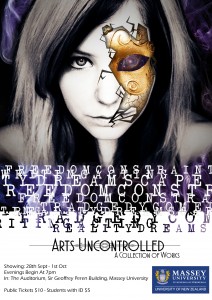 Featuring six plays, a short film and original poetry, all the pieces have been written by local artists from the Manawatu area. With everything from comedy to tragedy to surrealism, the team behind it have summarised it as ‘a celebration of our community’, with submissions from first time youth writers as well as award-winning professionals.
Featuring six plays, a short film and original poetry, all the pieces have been written by local artists from the Manawatu area. With everything from comedy to tragedy to surrealism, the team behind it have summarised it as ‘a celebration of our community’, with submissions from first time youth writers as well as award-winning professionals.
Artistic Director Tobias Lockhart says that the showcase came about specifically to offer a wider set of opportunities. “The performing arts scene in Palmerston North is so massive, it can be a little daunting. This showcase gives new and upcoming members of the community a chance to shine and become part of the larger scene. With both experienced and new members of the cast and crew, everyone can learn something from one another.”
“For the audience our focus is on making this showcase to be an experience – with something for everyone. Art is something you have to engage with, and our performance will have a range of genres and styles; some humorous, some dealing with more serious issues. By placing no limits on what could be included we opened it up so everyone watching will have something they connect with or enjoy.”
Arts Uncontrolled opens next Wednesday 28th September and runs for four shows. Held in Massey University’s Sir Geoffery Peren Building’s Auditorium, doors will open from 7pm, with a selection of poetry and art to be viewed in the space before the show begins at 7:30 pm.
Tickets: Full $10.00, Students with ID $5.00
Dates: Wednesday 28th September – Saturday 1st October
Time: Space opens 7pm, show begins 7.30pm
Venue: Sir Geoffrey Peren Building, Massey University, Tiritea Road, Palmerston North
Bookings: Email t.lockhart@live.com
NUTS NZ Newsletter #11
Editorial
Welcome to eleventh edition of NUTS NZ – the Newsletter for University Theatre Studies New Zealand. The purpose of the newsletter is to help us communicate more effectively as a community of scholars interested in Theatre and Performance. We have an interesting selection of stories and items for you in our third issue for 2016. In this issue, in our “NUTS People” segment, we profile Nicola Hyland and Lekan Balogun. We have also included information on Professor Peter O’Connor inaugural professorial lecture titled “Pedagogies of Surprise: The joy and art of teaching.” We are also promoting the Augusto Boal Applied Theatre Workshop; it is an intensive workshop held in Auckland on the weekend of the 2nd and 3rd of September. We have quite a range of performances (past and upcoming) to showcase along with an update from the ADSA Awards and Murray Edmond’s latest publication. Further to this, we have added a segment about Victor Rodger’s Latest project FCC. Rodger is this year’s Robert Burns Fellow at the University of Otago. We plan to circulate our twelfth edition of NUTS NZ on the 11th of November, and we will need items of news by the 28th of October (especially an academic and postgraduate student to showcase). As always, submissions should be sent to the NUTS NZ editor Jane Marshall: j.g.marshall@massey.ac.nz
Kind regards,
NUTS NZ editors: Jane Marshall and Rand Hazou.
| Newsletter Issue | Information Required by | Date of Circulation |
| Issue 12 | 28 October 2016 | 11 November 2016 |
NUTS People
Nicola Hyland
Research: My recent research is mostly about ways of looking at contemporary Māori performance using ideas and values from Te Ao Māori. I write about performances that I feel really strongly about; shows that make me angry or electrified. I also dabble in a bit of performance studies, researching events and encounters outside of the theatre using post-colonial and critical race theory angles. That’s where Beyoncé comes into it.
Theatre: A few goodies were Red Leap’s Dust Pilgrim, Te Rehia’s Solotello and Mana Wahine by Okareka Dance theatre. That show was the business.
Reading: I just finished A Brief History of Seven Killings by Marlon James, set around the attempted assassination of Bob Marley. I’m reading a script in development about love and mountain climbing in Wanaka. Plus a bunch of plays and strategic reports from the “stuff I’m working on” box.
Lekan Balogun
Research: My research and background are in the areas of script writing and directing, Mask performance and Yoruba ritual and aesthetics, especially in the aspects of comparative studies with other world religions. In my ongoing PhD research in the field of postcolonial Shakespeare adaptation, I am applying that knowledge to explore the cultural and political relevance of a range of adaptations of Shakespeare, drawn from across the globe. I classify these works (some familiar but previously read differently) as Orisa, a term which describes both Yoruba arts and religion. As part of the research, I will also develop a new adaptation of Julius Caesar, which examines present-day socio-political situation in my country, Nigeria.
Theatre: I saw two plays at Circa Theatre recently courtesy of the British Council in Wellington: King Lear, starring Ray Henwood as King Lear, and as directed by Michael Hurst; and SolOthelloby Regan Taylor. While I wasn’t disappointed with the first at all because the directing was good and actors really great, Regan’s one-man interpretation of Shakespeare’s Othello was awesome.
Reading: At the moment I am reading Alexander Leggatt’s Shakespeare’s Political Drama; Michael Hattaway (ed) The Cambridge Companion to Shakespeare’s History Plays; and Alun Munslow & Robert, A. Rosenstone (eds) Experiments with Rethinking History, in order to guide the writing of my adaptation of Shakespeare’s Julius Caesar.
Upcoming Lectures
Professor Peter O’Connor inaugural professorial lecture: “Pedagogies of Surprise: The joy and art of teaching.”
Hosted by the University of Auckland, Faculty of Education and Social Work
Peter O’Connor’s inaugural professorial lecture is a celebration of excellence in research undertaken by one of the Faculty of Education and Social Work’s most recently appointed professors. Professor Peter O’Connor is an internationally recognised expert in applied theatre and drama education. His work focuses on the difference that creativity can make in the lives of the disenfranchised and marginalised in our communities. Peter is the founding director of Everyday Theatre, a national theatre in education programme on preventing family violence and child abuse, and the Teaspoon of Light Theatre Company.
When: Tuesday, 20 September 2016 from 6:00 PM to 8:00 PM. 6pm Drinks reception | 7pm Inaugural lecture
Where: Neon Foyer, Faculty of Engineering – 20 Symonds Street, Auckland, Auckland 1010
Workshops
APPLIED THEATRE: TWO DAY INTENSIVE WORKSHOP.
AUGUSTO BOAL METHODOLOGY & THEATRE OF THE OPPRESSED
“We are all actors: being a citizen is not living in society, it is changing it.” Augusto Boal (1931-2009).
DAY 1 • Introduction to Boal • Warm Ups • Acting for Non-Actors • Introduction to Image Theatre DAY 2 • Warm Ups • Introduction of The Joker • Application of Image Theatre • Organisational Setting Practice • Joker Practice Skott Taylor is a trained actor, director and musician with a specialisation in theatre and development from Concordia University, Montreal, Canada. Skott is the founder and director of NewSeed Creative Consulting which focuses on working with companies to align their purpose driven cultural vision and business strategy through theatre-based engagement techniques. With over 12 years of experience in China, Hong Kong and Taiwan Skott has teamed up with Fiona Mogridge & Co. of Auckland, New Zealand to develop and deliver programs to both for-profit and non-profit companies around Asia and New Zealand. Learn the methodology of Augusto Boal’s theatre of the oppressed alongside actors trained in theatre and specific Boal techniques. This is an intensive two day programme of professional development which introduces you to the history and technique of Boal work, with the added focus on how you can use these techniques with people in various settings. The interest and positive feedback from their last workshop at TAPAC has meant a return this year with a specific focus on applied techniques for work in the community and organisations. You may be an artist, a facilitator, a teacher, or work across social and organisational development, or simply someone interested to explore and learn. Join Skott and Fiona on a journey of discovery to build your skill in using these techniques for effective group work.
Date: Friday 2nd and Saturday 3rd September 2016
Location: TAPAC, 100 Motions Road, Auckland, New Zealand
Price: $300 (artist rate applies)
Booking: www.tapac.org.nz (Masterclasses & Workshops) Information: Please email – fiona@creativebusiness.co.nz
Performances
Frankenstein in The Gym
The Free Theatre Christchurch’s recent season.
Below is a link to some reviews of the season.
http://www.freetheatre.org.nz/frankenstein.html
“Finely balances spectacle, performance and audience engagement”
Erin Harrington, Theatreview, 18 June 2016
“Free Theatre’s latest offering “completely mad””
Georgina Stylianou, The Press, 18 June 2016
Love and Information- By Caryl Churchill
Directed by Rachel Lenart for “Modern Drama,” Massey University, Palmerston North Campus, June 2016
“What do you think? Is it better to know things or not know things”
Massey’s 300 level paper, Modern Drama involves the study of six plays from the late nineteenth century to today. The plays chosen for study all significantly shifted the perceptions of theatre of their time, many revolutionising the form entirely. This year, after six weeks of study, Palmerston North students faced a tough question, which play would we take into production. The choice was entirely theirs. The class staged a dramaturgical debate where the ideas were vigorously explored. Brecht’s Mother Courage and Her Children went head to head against O’Neill’s The Hairy Ape but the overwhelming support was behind Caryl Churchill’s 2012 play; Love and Information. Through passion and reason, team Churchill rallied the rest and pulled voters to their side. And so, the 2016 Modern Drama production process began.
Love and Information is a dense and daring text. It redefines tradition concepts of narrative, it disregards character development, favouring ideas. A bombardment of ideas, issues, feelings. With a team of two student dramaturgs, we began to dissect this play and its themes and musicality, its richness and its humanity. The play is divided into seven sections, each containing seven scenes. It is presented as screeds of unattributed dialogue. Churchill stipulates that while each section must be performed in order, the scenes within them should be shifted around as preferred by the company. The play ends with a final scene, that must conclude it, called Facts. In this scene, a series of facts are questioned and answered, again by unspecified voices. An amazing 11th hour discovery by a student dramaturg, revealed that none of these facts are true!
Each student took on both a production and a performance role in this project, from design to publicity and stage management with a vision focussed by the dramatrugs and director. It was a thrilling, intense and thoroughly rewarding process.
“Outstanding Ensemble”- Richard Mayes, Tribune.
Upcoming Performances at The University of Auckland
The University of Auckland has a season of 5 postgraduate productions by MA students coming up in October, including work by Beth Kayes, Kayleigh Haworth, Anton Antsiferov and Rachel Longshaw-Park.
Flow, Create, Connect – Victor Rodger’s Latest Entity.
Award-winning playwright and this years Robert Burns Fellow at the University of Otago, Victor Rodger, started monthly play readings in Auckland last year. These readings are of diverse plays that were mostly unproduced in New Zealand under the umbrella of his entity FCC (Flow, Create Connect). Calling on a combination of veterans and newcomers, the results have been threefold: to give diverse practitioners a chance to deal with well-written complex roles that they are generally not getting in mainstream productions; to expose audiences to these largely unfamiliar texts; and to ultimately stage some of these plays in professional productions. The readings began last year with John Kneubuhl’s Think of a Garden and have since included plays such as Sugar Mummies by Tanika Gupta, Yellow Face by David Henry Hwang and Barbecue by Robert O’Hara. There have also been readings in Sydney, Christchurch, Wellington and Dunedin. The first FCC reading to go on and receive a full production was Puzzy by Hawaiian-Filipina writer Kiki (co-written with Rodger). It debuted at The Basement this year to critical acclaim. The next FCC reading to go into full production will be Tusiata Avia’s Wild Dogs Under My Skirt at the Mangere Arts Centre next month. See the flyer below.
Wild Dogs Under My Skirt
ADSA Awards Update
NZ theatre scholars were well-represented at the ADSA awards this year. Nicola Hyland won the Marlis Thiersch Prize for the best published article or chapter for her article: “Beyoncé’s Response (eh?): Feeling in Ihi of Spontaneous Haka Performance in Aotearoa/New Zealand” in TDR: The Drama Review 59(1): 67 – 82. Marianne Schultz was given an honourable mention for her 2015 article: “A ‘Harmony of Frenzy’: Maori in Manhattan, 1909-10” in Theatre Journal 67(3): 445 – 464.
Ex-pat Diana Looser won the Rob Jordan Prize for Best Monograph for Remaking Pacific Pasts: History, Memory and Identity in Contemporary Theatre from Oceania Honolulu: University of Hawai’i Press 2014. Emma Willis was named runner up for Emma Willis, Theatricality, Dark Tourism and Ethical Spectatorship: Absent Others US and UK: Palgrave Macmillan 2014.
Recent Publications
Murray Edmond has an article in the forthcoming Journal of New Zealand Literature about playwriting in New Zealand from 1975 to 2000: ‘Not Much to Do Except Watch Each Other’s Lives Unfold: Playwriting 1975-2000 in Aotearoa.’
National Playwriting Win for Robert Gilbert
 One of our theatre graduates, Robert Gilbert, has just won the Playwrights’ Association of New Zealand Ten-Minute Playwriting Competition. His play ‘Between the Aisles’ was described by the judge as ‘original, funny and cleverly written’. Robert is not new to playwriting, having written several plays for young adults. His most recent play ‘Trans Tasmin’ dealt with issues of transgender and was developed as part of his M.A. which he completed at Massey University under the supervision of Angie Farrow. Great work, Robert!
One of our theatre graduates, Robert Gilbert, has just won the Playwrights’ Association of New Zealand Ten-Minute Playwriting Competition. His play ‘Between the Aisles’ was described by the judge as ‘original, funny and cleverly written’. Robert is not new to playwriting, having written several plays for young adults. His most recent play ‘Trans Tasmin’ dealt with issues of transgender and was developed as part of his M.A. which he completed at Massey University under the supervision of Angie Farrow. Great work, Robert!
High praise for Justus student production
Huge congratulations to the Creativity in the Community students involved in JustUs for more fantastic feedback on their play with a Radio New Zealand story today!
Youth Justice Play Sparks Debate
Youth justice has been put under the spotlight in a new stage show by a group of Massey University Creativity in the Community students at Wellington campus.
The production comes at a time when the Government is considering whether or not to raise the age of New Zealand’s Youth Court jurisdiction, and has sparked lively debate.
See more via this TV3 video: http://www.newshub.co.nz/entertainment/play-examines-realities-of-youth-in-adult-justice-system-2016060923#ixzz4BVE5ThG7
The play has also sparked discussion of the issues on Radio New Zealand’s The Panel.
Hear more via this podcast: http://www.radionz.co.nz/national/programmes/thepanel/audio/201804313/age-of-adult-criminal-responsibility
